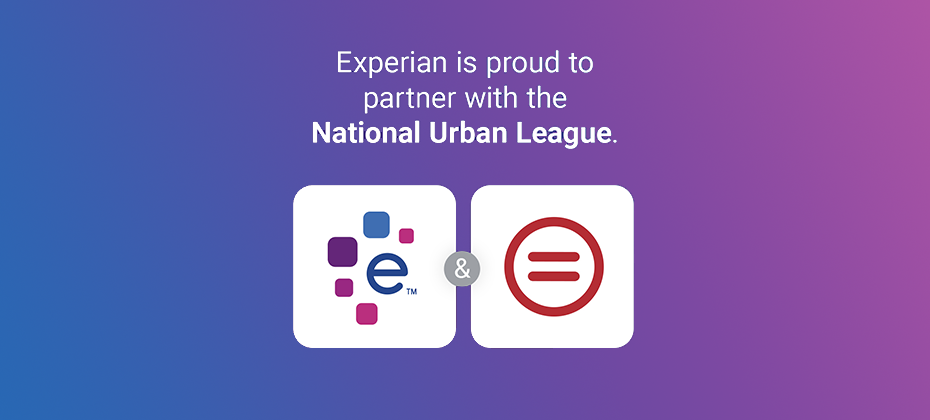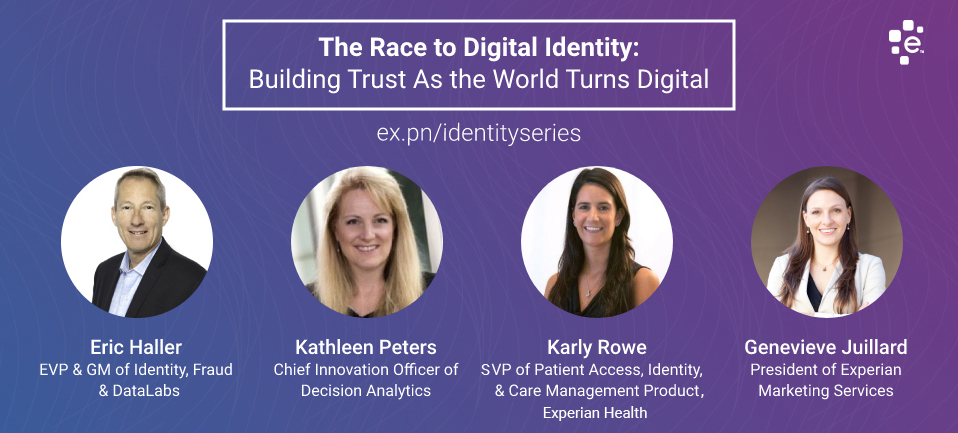Tech & Innovation

At Experian, we are continually innovating and using technology to find solutions to global issues, modernize the financial services industry and increase financial access for all.
DEI

Our deep commitment to social and financial inclusion is reflected in our workplace culture, our partnerships and our efforts to break down the barriers to financial equity.
Financial Health

Our initiatives are dedicated to getting tools, resources and information to underserved communities so that consumers can best understand and improve their financial health.
Latest Posts:

Growing up, my family rarely talked about money. So, in college, when I had the opportunity to get my first credit card, I also found myself in a little trouble when the first bill came. Most of us simply don’t learn about money matters until we find ourselves in these difficult situations. That’s one of the reasons why we’re excited to launch a creative and new program to teach young adults about the basics to building a financial legacy. “Protect The Bag” debuts today. It’s a six-part web series produced in partnership with Grammy-award winning artist, entrepreneur, author and community advocate, Lecrae. We first met Lecrae when he supported a United for Financial Health initiative in his hometown last year. “Protect The Bag” is a hip master class with finance and credit basics presented in an authentic way. Lecrae describes it as “edutainment” that includes scripted skits and interviews with everyday people. His friends Tyler Lockett, Coco Jones and WHATUPRG, among others, join him and share their financial health journeys as part of the shows as well. “Protect The Bag” is not just about credit. It’s about all aspects of personal finance. We’re proud of this innovative way to help consumers understand topics like saving, investing, budgeting and identity protection through someone they admire and trust. We hope you tune in every Tuesday, starting today, for the next six weeks. Episodes will appear on Lecrae’s YouTube channel starting at 7:00 p.m.EST/4 p.m.PST.

I am delighted to have announced our new partnership with Code First Girls, a non-profit organisation that teaches women to code for free, and helps increase the number of women – an under-represented group – working in tech. As a South African woman of Indian heritage, a single parent of two bi-racial girls aged 18 and 22, and a human resources executive with a passion for talent, leadership, and development, I work daily with my team to support Experian deliver on its brand promise of powering opportunities to create a better tomorrow for our people, consumers and businesses globally. So I am personally and professionally very proud of this development. Our partnership means four young women can study for a Code First Girls‘ Nanodegree, while working as paid interns in EMEA for the next nine months. These young talents come from diverse backgrounds, helping us diversify our workforce and bringing fresh thinking and new perspectives. They’ll benefit from our flexible ways of working, being based primarily from home. They’ll gain international experience as they are joining our Data Science and Innovation teams in South Africa and Italy. Moreover, they will help us drive our financial inclusion agenda by working on our United for Financial Health programme. This means we will have four young women working on financial inclusion solutions for women and four 18 to 25-year-olds working on financial inclusion solutions for the same demographic. This is a people-led innovation that contributes to the circular economy and adds purpose to our Company’s commitment to Diversity, Equity & Inclusion in its fullest sense, supporting our sustainable business goals. This isn’t philanthropy or theory. This partnership means our interns will work hard, learn and develop themselves as they prepare for a career in data and tech. It means we will also learn and evolve through this initiative. I’m curious: how do young, fresh talented people experience us? Will this partnership really enable four young women to start sustainable, fulfilling careers in tech, data, artificial intelligence, or software development? Will it help Experian attract and retain the best early tech talent in future? As with every innovative step we take, we’re unsure of the outcome, and that’s OK, as well as exciting. What is important is that we’ve started a new journey together, and I’m excited to see where it takes us. If you’d like to meet our EMEA interns and track their journey, follow us on Facebook, Instagram, LinkedIn and Twitter.

Over the last 19 months the pandemic has disproportionately impacted underserved and low-income communities and exacerbated the health and economic situations of millions of consumers, making it even harder to recover from financial hardships. We’ve made it our mission to change this, and we’re doing so by unlocking the power of data to facilitate access to fair and affordable credit and create new opportunities for people and businesses. We use our products, services, and time to make a real difference to the financial lives of people in many ways. This is at the heart of what we do as a company, and it’s one of the many reasons why it’s such a great honor to be named by Fortune to its global ranking of the top 50 companies making measurable progress addressing social problems. Experian Boost is one example of our commitment to improving financial inclusion, providing users access to credit as a result of improved credit scores. Two years ago, we created this first-of-its-kind service designed to help consumers instantly improve their credit score by giving them credit for on-time utility, telecom, and streaming service payments. Experian Boost in the USA and UK, combined with Serasa’s Score Turbo in Brazil, are empowering consumers to take more control of their financial well-being and promoting financial inclusion. United for Financial Health is another new financial recovery program we created to help consumers who don’t typically have access to credit. Through this initiative we teamed up with 11 NGOs to reach 35 million people in less than a year, smashing our first-year target of 15 million. The partnerships this year have focused on three primary consumer markets – the USA, the UK and Ireland and Brazil. That said, we recognize there is more work to be done. In our 2021 Sustainable Business Report, we made several commitments, including to reach 100 million people through our United for Financial Health campaign by 2024. We remain focused on using our business to make real, sustainable change. Being named on Fortune’s 2021 'Change the World' list is also a testament to our truly inclusive culture at Experian, where everyone’s hard work and commitment is proving to deliver a positive impact to society. Through our investments in data and advanced analytics, we will continue to help lenders identify consumers who are excluded from the credit ecosystem, but who can fulfill their financial obligations and pay responsibly. We want to empower consumers to take control of their financial lives, and we will continue to take strides to do so, ensuring we do the right thing for those we serve.

The largest Hispanic civil rights and advocacy organization in the U.S., UnidosUS, held its LatinX IncluXion Summit this week and I had the pleasure of participating as a featured speaker. One of the conference’s themes this year was “Reimagining our Future” and that resonated with me quite a bit. As an immigrant who has had to reimagine my life and career many times over, I shared some advice on how we can reinvent ourselves, become empowered by those opportunities and give back to our communities. Experian’s support of UnidosUS is especially meaningful to me. As co-executive sponsor of Juntos, our Hispanic and Latino employee resource group, I’m proud to be part of our partnership launch that extends beyond the conference. As part of our United for Financial Health initiative, Experian is supporting the organization’s Financial Empowerment Network (FEN) which provides free, financial coaching for Latino families. I have always been passionate about financial inclusion because I believe it helps empower people to be independent and take care of their families. This is especially true for immigrant communities that already must deal with the challenges of acclimating to a new country, culture, language, and more. Since joining Experian, I have been involved in initiatives that look to expand access for disenfranchised consumers, and a huge portion of my volunteerism has been devoted to educating this community about the benefits of intentionally managing their budgets and what are the best ways to gain access and handle credit. It’s not just UnidosUS affiliates and members who will benefit from our cross-cultural work. Our new Spanish-language consumer education e-book, credit education articles in Spanish, and the new monthly #ChatDeCrédito launched during Hispanic Heritage Month are available to all consumers. Having credit education resources available in-language is just one of many ways we can help those who have faced barriers to accessing credit and financial tools. We look forward to our partnership with UnidosUS and continuing to empower the Hispanic-Latino community.

Black History Month launches in the UK today. Throughout the month, we’ll be holding a series of events to support Black British people to realise their personal financial and business aspirations. Look out for webinars on Credit Scores and Property Investing on 6th October and Credit Scores and Entrepreneurship on 13th October, with guest speakers including Kazeem Alli-Balogun, Sebastian Newby, Stephanie Taylor, Rachael Twumasi-Corson from Afrocenchix, Ismail Oshodi and Raphael Sofoluke. Register here. The last week of October also sees the launch of the first Experian Entrepreneur Challenge, a 5-day bootcamp helping Black micro-entrepreneurs define the roadmap towards business success. The week includes topics like how to spot opportunities for business expansion, and formalising business and funding growth, with special guests from Experian teams holding masterclass sessions on topics like market research, marketing and recruitment. At the end of the week, entrepreneurs will pitch for £3000 worth of funding to help grow their business. Participants will be uploading video diaries over the course of the week, which takes place from 27th October onwards – you’ll be able to check out their experiences on our YouTube channel here. Finally, the Experian team will be sharing personal experiences and career advice at two exciting events, Black Tech Fest and UK Black Business Week. We’re proud to be sponsors of both events. Watch out for more updates and ways to join in virtually nearer the time!

The historic civil rights organization, the National Urban League, kicked off its first-ever virtual national convention recently, and Craig Boundy, former Chief Executive Officer of Experian North America had the honor of joining them. National Urban League President and CEO Marc Morial and Craig announced our new partnership that will support financial inclusion and credit education. During the announcement, Marc mentioned one of the key findings of the Urban League’s 2021 State of Black America – The New Normal: close to 17 percent of Black households lacked basic financial services, compared with three percent of white households in 2017, the last year for which FDIC statistics are available. He characterized this as a “disastrous and disproportionate impact of the COVID pandemic on the economic stability of African American communities.” We believe working together will make a big difference in the lives of underserved consumers. As part of our United for Financial Health program, Experian is providing National Urban League members access to credit education tools and services like consumer credit reports and Experian Boost™, as well as resources for small businesses. As Craig mentioned in his remarks, “at the heart of this partnership is knowledge: when you understand financial services, you come to understand the financial system. You can take steps to create and improve a relationship with financial service providers. That can make a huge difference today, and for future generations.” This partnership is just the start of our relationship with the National Urban League, and we look forward to working together towards closing the wealth gap and empowering consumers to achieve their life’s goals.

With data technology and innovation as the backbone of our company and with our commitment to celebrating diversity, we are proud to share an incredible recognition: AnitaB.org has named Experian North America a Top Company for Women Technologists. Organizations on this list are committed to building workplaces where women technologists can thrive, and this honor is considered an industry benchmark for progress toward equity. Our culture of inclusion internally at Experian fuels our innovations to achieve financial inclusion externally. Being named a Leader by AnitaB.org for the second time affirms we’re moving in the right direction. September has been a big month for us: we also earned a place in Fortune’s Best Workplaces for Women and PEOPLE’s 100 Companies That Care 2021 lists for the first time. My colleague and fellow leader for our Women in Experian employee resource group Karen Tatten shares my sentiments: “It’s fantastic to see our efforts to hire, promote and retain top female talent recognized in the marketplace. It’s a tremendous honor and reminder to all women in Experian of why we chose Experian for our career journey.” At Experian North America, men and women are promoted equally. More than half of our new hires and close to half of all employees identify as women. Former Chief Executive Officer Craig Boundy was recently recognized as a Best CEO for Women by Comparably, an acknowledgement especially meaningful because the award relied solely on the input of employees. Even with these accolades, we strive for better. This year, we are committed to a specific goal for the company globally to help close the gender gap. By 2024, Experian pledges to increase the proportion of women in our executive committee and direct reports to 30%, our senior leaders to 40%, our mid-level leaders to 42%, and our total global workforce to 47%. We look forward to sharing our progress.

At Experian, we are continually innovating and using technology to modernize the financial services industry and satisfy the real-time data demands of consumers and businesses. Therefore, we are thrilled to rank #11 on the 2021 IDC FinTech Ranking. This is an impressive jump from #45 last year. Experian has a rich history of helping financial institutions with a wide range of challenges, including opening-up credit to underserved communities, adapting to changing consumer expectations and behaviors, addressing the growing threat from fraud, and becoming a more agile technology provider in an ever-changing market. We help thousands of businesses lend responsibly, provide services quickly and seamlessly and protect against fraud, and have continued to do so even during the testing times of the last year and a half. The robust data assets of Experian, combined with best-in-class modeling, decisioning and technology are powering new and innovative solutions. Experian continues to heavily invest in new technology and infrastructure to deliver the freshest insights, at the right time, to make the right decision. Our technology helps transform the way businesses operate and consumers thrive today. We believe every consumer deserves access to fair and affordable credit and are committed to helping our clients better serve and provide greater financial opportunities for everyone. The 18th annual fintech ranking represents the leading hardware, software, and service providers to the financial services industry from around the world. Vendors are ranked based on 2020 calendar year revenues and the percentage of revenues exclusively attributed to financial institutions, including banks, capital markets firms and insurers. View the list in its entirety here. The ranking also refers to Experian as a “Rising Star."

The way we identify ourselves is ever-changing. The growth of the digital world has played a huge role in this. Identity used to be based on basic information: phone numbers, driver’s license information, information in a telephone book, etc. Now, as our world is moving more towards online preferences due to the COVID-19 pandemic, and people are identified by cookies, website preferences, usernames, and other identifying factors on their devices. As identity races towards a more digital perspective, we must be wary of how we can use this information to provide better customer experiences and how it can easily be stolen and taken advantage of. Experian held a special series as part of our DataTalk podcast that focused on the importance of identity and how Experian is utilizing identity throughout of different businesses. The series also looked at how Experian is constantly innovating to ensure our technology and data are being used to create the greatest benefits for our clients and their customers. Every week, Experian’s Director of Social Media Mike Delgado and Experian’s Social Media Specialist Destiny White are joined by data science leaders around the world for the #DataTalk podcast. Why authentication is important The challenge companies are facing is how to digitally identify individuals while maintaining a positive customer experience. They need to rely on new technologies including data, biometric, identity graphs and AI. Eric Haller, Experian’s EVP & GM of Identity, Fraud & DataLabs, speaks on these technologies as a guest on an episode of DataTalk. Businesses need to be able to separate real consumers from the bad guys and authenticate that they are who they say they are. Technology allows business to add secure measures that proves someone’s identity without causing too much friction. For instance, looking at information such as timing and mouse movement in an IP address will help quickly differentiate between a bot and a human. These methods are extremely important in protecting users in their e-commerce journey, something many individuals are utilizing more than ever since the COVID-19 pandemic. Being able to authenticate who someone is helps detect suspicious activity and differentiate between a fraud and a genuine identity, eventually protecting consumers from stolen information and the destroying of credit as well as the ability to take out loans. Using a layered approach to verify identities Kathleen Peters, Experian’s Chief Innovation Officer of Decision Analytics in North America, discusses in her episode of DataTalk how Experian helps protect consumers and businesses from fraud. She explains that identity is dynamic and the information that makes us who we are is always changing. In the past, people were identified by PII (Personally Identifiable Information). Now, we rely on information such as usernames and passwords, cookies, websites visited, and online preferences to create one’s identity. Due to this shift, Peters highlights the importance for businesses to build trust with customers. Because fraudsters have more access to credentials, businesses need to put the right advanced analytics and technology in place to validate and protect identities. Fraudsters are motivated and organized, therefore businesses need to use technology to stay one step ahead. The best thing businesses can do is to implement a layered approach so that they can have the right tools for the right time and apply the right level of authentication. Since our digital-first world is here to stay, businesses must ensure that they have the right tools in place to be agile in how they continually adapt and interact with consumers who are open to more practical means of security. How identity plays a role in healthcare Once trust is established and technologies that assist in authentication are utilized, many industries could benefit such as the healthcare industry. This industry has been under attack during the COVID-19 pandemic and it is important more than ever to avoid making identification mistakes. Karly Rowe, SVP of Patient Access, Identity, and Care Management Product at Experian Health, explains as a guest on DataTalk that data and technologies from Experian have been used to identify patients more accurate than ever, schedule appointments easily and even assist in contact tracing of COVID-19. This is done by using powerful data to fill in information on patients in order to authenticate them as well as find and contact them regarding any exposure to this virus. What marketers and advertisers can do with data and identity On top of contributing to the healthcare industry, Experian has also been using data and technology in the marketing industry. Data, analytics, tools and software are being provided to marketers and advertisers to deliver relevant messages to customers across their most preferred digital channels. Genevieve Julliard, President of Experian Marketing Services, explains in her DataTalk episode how identity is becoming more important than ever with the elimination of third-party cookies. Experian is embracing diversification of new identifiers across the information ecosystem to combine offline and online identity and data assets. With this approach, Experian is able to assist marketers by providing them with a clearer view of their customers across the buying journey and seamlessly deliver relevant content across all digital devices. No matter where the digital world takes us and what it means for identity, Experian is always embracing technology in order to keep up with the needs of its consumers. We use data and the most advanced technologies to confirm individuals, which makes us a leader in identity verification.


